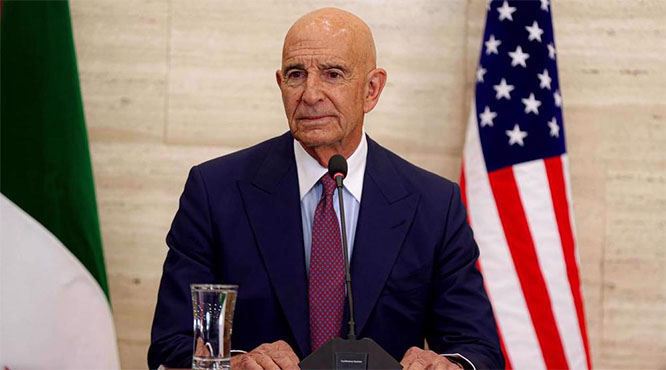In a sharp retort to US President Donald Trump's reciprocal tariffs charge, the Chinese embassy in the US said Beijing is ready to "fight till the end" in any type of war the US wants. "If war is what the US wants, be it a tariff war, a trade war or any other type of war, we're ready to fight till the end," the Chinese embassy's official handle posted on X after Trump's explosive remarks in a joint session at Congress.
Trump said other countries have used tariffs against the US for decades. "Now it's our turn to start using them against those other countries. On average, the European Union, China, Brazil, India, Mexico and Canada. Have you heard of them? And countless other nations charge us tremendously higher tariffs than we charge them. It's very unfair. India charges us auto tariffs higher than 100%. China's average tariff on our products is twice what we charge them. And South Korea's average tariff is four times higher," he said.
"This is happening by friend and foe. This system is not fair to the United States and never was... That's reciprocal back and forth. Whatever they tax us, we will tax them," he said.
Trump has increased previously imposed 10 per cent levies on Chinese goods to 20 per cent. China has filed a complaint with the World Trade Organization against the US.
"The United States' unilateral tax measures seriously violate WTO rules and undermine the foundation of China-US economic and trade cooperation," Beijing's commerce ministry said in a statement.
While imposing the tariffs, Trump accused China of not doing enough to halt the trafficking of fentanyl and other highly potent opioids into the US.
The Chinese Foreign Ministry has contested this. "The fentanyl issue is a flimsy excuse to raise US tariffs on Chinese imports. The US, not anyone else, is responsible for the #FentanylCrisis inside the US. In the spirit of humanity and goodwill towards the American people, we have taken robust steps to assist the US in dealing with the issue. Instead of recognizing our efforts, the US has sought to smear and shift blame to China, and is seeking to pressure and blackmail China with tariff hikes," it said in a statement.
"They've been PUNISHING us for helping them. This is not going to solve the US's problem and will undermine our counternarcotics dialogue and cooperation. Intimidation does not scare us. Bullying does not work on us. Pressuring, coercion or threats are not the right way of dealing with China. Anyone using maximum pressure on China is picking the wrong guy and miscalculating. If the US truly wants to solve the fentanyl issue, then the right thing to do is to consult with China by treating each other as equals," it added.







Comments
Add new comment